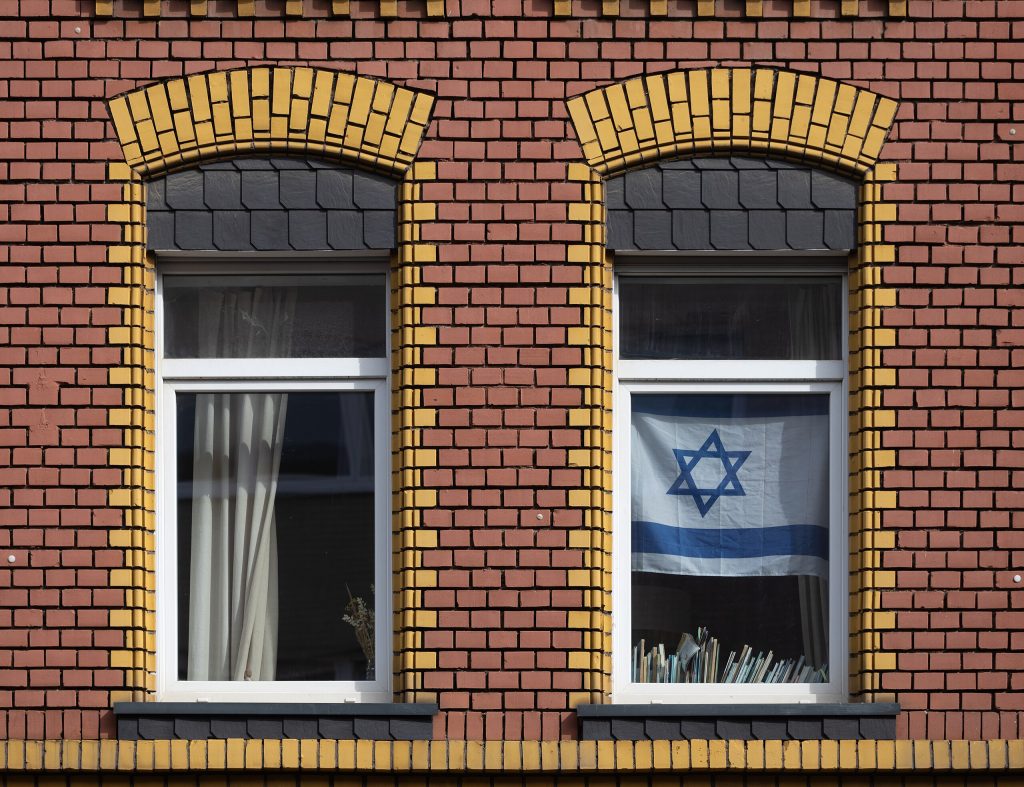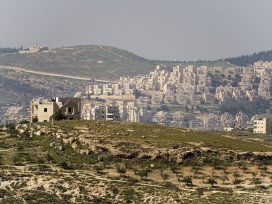
Israel has imposed different forms of settler colonialism across the map of historic Palestine, but nothing can be taken for granted. The refugee camp is itself a spatialization of a political demand, a space of waiting for an eventual return.
For many, Germany’s unconditional support for Israel since 7 October confirms that its memory culture has ‘gone haywire’. But particularly when it comes to German reservations about using terms associated with the Holocaust, postcolonial criticism is often markedly one-sided.
Since last spring, I have been on an extended tour to promote my new book, Never Again: Germans and Genocide After the Holocaust, which looks at German responses to the ‘crime of crimes’ in other countries since 1945. Invariably, at least one audience member has asked me about German responses to Israel’s alleged genocide against the Palestinians. That was true before the Israeli military response to the Hamas attack of October 7, but the question now arises even more frequently, with greater urgency and emotion – more an accusation than a question. For all their talk of ‘never again’, my interlocutors wish to know, why are Germans not coming out more forcefully on this issue by condemning Israeli action in Gaza and the West Bank as genocide.
This jibes with increasing criticism of Germany’s vaunted Vergangenheitsbewältigung. If there was one thing historians and other observers of post-war Germany could all agree on – until recently – it was that the country’s efforts at ‘coming to terms with the past’ was a success story worth emulating. Just five years ago, Susan Neiman, the American-born director of the Einstein Forum in Potsdam, informed us in a much-noticed book, Learning from the Germans, that her native countrymen (and women) could and should take a page from the Germans when it came to ‘memory work’, especially when confronting their own country’s fraught legacy of racism, slavery and Jim Crow. She has since backtracked, recently claiming in the pages of the New York Review of Books that German Vergangenheitsbewältigung has ‘gone haywire’. What happened?
In a nutshell, reports after October 7 of a German ‘crackdown’ on pro-Palestinian demonstrations at home is ‘what happened’. But that’s not entirely accurate. Neiman, like a number of other academics and public intellectuals, had distanced herself from her earlier arguments prior to recent events in the Middle East, largely in the wake of a controversy initiated by A. Dirk Moses in 2021. In a polemical essay, the Australian-born historian, who now teaches at CUNY, posited a dark side to German memory culture: a distinct ‘reading’ of the Holocaust that not only immures German ‘elites’ to the suffering of other groups (read: Palestinians), but even makes them antipathetic toward those groups.
There is a prehistory to all this, one brewing for roughly the past decade: a questioning of the old narrative of successful German memory work that – ironically – burst onto the public scene around the same time that Neiman’s Learning from the Germans appeared in 2019. In his now (in)famous piece, entitled ‘The German Catechism’, Moses identified three main catalysts for this revirement: ‘the heated German debate about Achille Mbembe’s alleged antisemitism, Michael Rothberg’s book, Multidirectional Memory, and Jürgen Zimmerer’s Von Windhuk nach Auschwitz?’, which posits lines of continuity between German colonial practices and the Holocaust.

Window in Cologne, 2024. Image Elke Wetzig / Source: Wikimedia Commons
What should we make of recent claims that we have been too quick to praise the Germans for their ‘culture of remembrance’? The naysayers’ case – which one might dub the ‘Postcolonial Catechism’ (with due respect for the important insights offered by the field of postcolonial studies as a whole) – consists of six main arguments:
These arguments and criticisms cannot and should not be dismissed out of hand. But they are also distorted, exaggerated, and unduly polemical – and they ignore important context! With respect to the last point, those who have posited a recent turn for the worse in Germany’s ‘culture of remembrance’ have not made any real attempt to explain the roots of this sudden transformation, apart from vague allusions to growing concerns about immigration and asylum requests by the ‘wrong sort’ of foreigner from places like Syria, Israel’s longtime foe.
What they leave out is the elephant in the room, namely, the statistically verifiable uptick in antisemitic incidents in Germany over the past few years, from the violent Yom Kippur attack at a synagogue in Halle in 2019 to conspiracy claims that COVID-19 was a Jewish plot (‘Jew flu,’ ‘Holocough’). It is true that the vast majority of such incidents are committed by white Germans on the extreme right of the political spectrum – though, to be clear, certain groups of ‘non-ethnic’ Germans are disproportionately represented. This is important context for understanding the recent ‘hysteria’ – for understanding, say, the controversial resolution adopted in 2019 by the Bundestag, which condemned (to my mind, mistakenly) the Boycott, Divestment, Sanctions (BDS) campaign against Israel as antisemitic and called for cutting off funding to any organizations that ‘actively support’ the BDS movement.
But the ‘Postcolonial Catechism’ misleads in a different way as well. German responses to genocide in other lands, the subject of my recent book, provide a clear example of how memories of the Nazi period were used by Germans in support of other traditionally persecuted groups, including Muslims, not to deny them succour or sympathy – a clear instance of Rothberg’s ‘multidirectional memory’ in practice. German efforts at Vergangenheitsbewältigung may not always have been perfect, but let’s not throw the baby out with the bathwater. It remains one area where the Federal Republic can rightly claim to be a success story, especially as it begins to grapple in earnest with its colonial past, in contradistinction to most of its allies in the rest of Europe – and across the Atlantic.
The point is not to deny that some Germans have made accusations of antisemitism in an instrumental way: to stoke xenophobia and advance an anti-immigrant agenda. Nor am I trying to justify or excuse official excesses in response to perceived antisemitic agitation and calls for violence. But because of their past, Germans are finding themselves once again in a difficult position of being ‘damned if they do and damned if they don’t.’ One can only imagine the reaction from abroad (and at home) if German authorities were to look on passively as critics of Israel pass out celebratory baked goods in central Berlin in response to the murderous rampage of 7 October, or call (implicitly or explicitly) for the destruction of Israel. In the end, Günther Jikeli has observed, the ‘accusation of antisemitism becomes the problem, not the statements that precipitated it’.
Now, one should not automatically equate anti-Zionism with antisemitism, but one should also not deny that there is often a link – a tension captured in the competing statements on the topic by the International Holocaust Remembrance Alliance and by signers of the Jerusalem Declaration. To state the (often overlooked) obvious: one has to judge each incident on a case-by-case basis, not make broad, misleading generalizations about, for instance, German authorities offering unconditional support to Israel or suppressing civil liberties by ‘cancelling’ all critics of Israel and cracking down on all forms of pro-Palestinian protest.
What about German responses to the claim that Israeli policies toward the Palestinians constitute genocide? Many Germans are understandably wary to use that charged term when it comes to the Middle East because of their own history – the same reason why German officials have kept a tight rein on pro-Palestinian demonstrations at home, even those involving Jewish critics of Israel. The latter in particular have indignantly asked what right Germans have lecturing Jews about the appropriateness of such allegations and language.
Besides, don’t Germans have a duty to call a duck a duck, so to speak – even more so because of their past? According to those who argued in favour of German participation in military efforts against the Serbs during the carnage in Bosnia in the early 1990s, their country had – in the words of then foreign minister Klaus Kinkel – ‘a political and moral duty to assist, precisely in light of our history’. Such considerations place Germans in a difficult position.
One can, in theory – and with an eye to international law and the provisions of the 1948 UN Convention on the Prevention and Punishment of Genocide – have an open, sober, and rational discussion about whether Israeli actions against the Palestinians constitute genocide, which the Convention defines as a series of specific ‘acts, committed with intent to destroy, in whole or in part, a national, ethnical, racial, or religious group, as such.’ But there is a difference between legal definitions, on the one hand, and popular, emotional understandings of the term, on the other. There has long been a tendency – not just in Germany – to equate genocide with Auschwitz. As a result, those who invoke the term to describe crimes that fall below the threshold of industrialized mass murder are often suspected of ‘whitewashing’ past German crimes by ‘relativizing’ the Holocaust.
What this suggests is that much of the debate has to do with subtexts, imputed (political) motives, and unspoken yet understandable fears about consequences that might follow from a broader, seemingly less indiscriminate use of the term genocide – regardless of its legal applicability. For similar reasons, many Germans react aversely to other loaded terms like apartheid and ghetto when it comes to characterizing Israeli policies – or to words like boycott in calls for international sanctions against Israel.
Again, one can have a rational discussion about the appropriateness and fairness of such terms. But one can also understand why, in the context of centuries of anti-Semitic persecution culminating in the Holocaust, supporters of Israel and Zionism see loaded terms like these as ‘microaggressions.’ At the same time, they wonder why those who denounce the use of microaggressions against other traditionally persecuted groups seem to have less qualms about them when it comes to Jews, or less understanding for Jews who perceive and denounce them as such.
A popular if narrow understanding of what constitutes genocide – industrial mass murder – is nevertheless one reason why the injunction ‘never again’ remains an unfulfilled aspiration. This limited understanding means that other acts of mass persecution are overlooked. The purported deportation and ‘russification’ of Ukrainian children would, for instance, clearly count as a form of genocide, according to the terms of the 1948 UN Convention. Does the same hold true for the forced evacuation of Palestinians from Gaza and the West Bank, which critics of Israel denounce as ‘ethnic cleansing’, or a humanitarian crisis that some have described as ‘a deliberately engineered famine’?
That is a question worth serious deliberation, and one upon which the International Criminal Court’s verdict in the case that South Africa recently brought against Israel will ultimately shed light. Until then, both critics and defenders of Israeli policies should avoid inflammatory language – or at least be more circumspect about using loaded terms that needlessly provoke and thus do more to hinder than abet debate and actions that might help innocent people in Gaza and elsewhere.
This article was first published in Public Seminar on 6 March 2024
Published 22 March 2024
Original in English
First published by Public Seminar
Contributed by Public Seminar © Andrew I. Port / Public Seminar / Eurozine
PDF/PRINTSubscribe to know what’s worth thinking about.

Israel has imposed different forms of settler colonialism across the map of historic Palestine, but nothing can be taken for granted. The refugee camp is itself a spatialization of a political demand, a space of waiting for an eventual return.

The two-state solution is often seen as empty talk. But it is the only alternative that offers a realistic prospect of peace in Israel-Palestine and the wider region. Putting it into practice will require not only genuine, detailed discussion, but above all a fundamental shift of mindset.